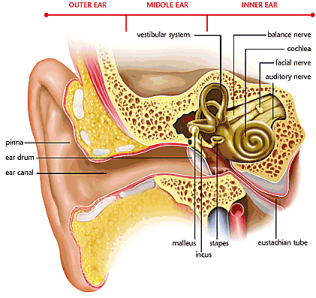Frequently Asked Questions “FAQ”:
Q: What causes hearing loss?
A: Hearing loss may be caused by aging, excessive noise, genetic composition, ototoxic drugs, head trauma, and/or illness.
Q: What is sensorineural hearing loss?
A: Sensorineural hearing loss, also referred to as nerve deafness, is most commonly due to necosis in the hair cells of the cochlea. On occasion sensorineural hearing loss may be attributed to problems on the eighth cranial nerve (auditory nerve) which may be caused by a tumor (acoustic neuroma).
Q: How does excessive noise affect hearing?
A: Excessive exposure to loud sounds without hearing protection destroys the cochlear hair cells causing sensorinueral hearing loss. This hearing loss may be prevented by using hearing protection devices. Excessive or loud noise which is harmful may include shooting, aircraft noise, gardening equipment, rock bands, or even the home television.
Q: How can genetics affect hearing loss?
A: As of 2006, researchers have identified 145 different genetic loci that cause hearing loss in humans. Recent studies have revealed that approximately 50-60% of moderate to profound, congenital, or early-onset hearing loss is genetic. The remaining 40-50% of hearing loss is due to non-genetic effects, such as maternal infection (CMV or rubella), prematurity, postnata infection (meningitis, otitis media), ototoxic drugs, or acoustic/ cranial trauma.
Q: What is BPPV?
A: Benign paroxysmal positional vertigo (BPPV) is a disorder that causes vertigo, dizziness, and other symptoms due to debris that has collected within a part of the inner ear. This debris, called otoconia, is made up of small crystals of calcium carbonate (sometimes referred to colloquially as “ear rocks”). With head movement, the displaced otoconia shift, sending false signals to the brain.
Q: What are symptoms of BPPV?
A: Symptoms of BPPV are almost always precipitated by a change in head position. Getting out of bed and rolling over in bed are two common “problem” motions. Some people feel dizzy and unsteady when they tip their heads back to look up. An intermittent pattern of these symptoms is usual.
Q: How can BPPV be treated?
A: Particle-repositioning maneuvers, including the Epley maneuver and the Semont-liberatory maneuver, are very effective in treating BPPV and can be performed in the doctor’s office in about 15 minutes. The goal of these maneuvers is to move the detached otoconia out of one of the semicircular canals. Treatment may also include individualized vestibular physical therapy exercises designed to help “retrain the brain.” The Brandt-Daroff habituation exercises are sometimes recommended and can be done at home. Canal-plugging surgery may be another option.
Q: What is otosclerosis?
A: Otoscelrosis is the abnormal growth of bone of the middle ear. This bone prevents structures within the ear from working properly and causes hearing loss. For some people with otosclerosis, the hearing loss may become severe.
Q: What are symptoms of otosclerosis?
A: Hearing loss is the most frequent symptom of otosclerosis. The loss may appear very gradually. Many people with otosclerosis first notice that they cannot hear low-pitched sounds or that they can no longer hear a whisper. In addition to hearing loss, some people with otosclerosis may experience dizziness, balance problems, or tinnitus.
Q: What causes otoscelrosis?
A: The cause of otosclerosis is not fully understood, although research has shown that otosclerosis tends to run in families and may be hereditary, or passed down from parent to child. People who have a family history of otosclerosis are more likely to develop the disorder. On average, a person who has one parent with otosclerosis has a 25 percent chance of developing the disorder. If both parents have otosclerosis, the risk goes up to 50 percent. Research shows that white, middle-aged women are most at risk. Some research suggests a relationship between otosclerosis and the hormonal changes associated with pregnancy. While the exact cause remains unknown, there is some evidence associating viral infections (such as measles) and otosclerosis.
Q: How is otosclerosis treated?
A: In many cases surgery is an option for treatment of otosclerosis. In an operation called a stapedectomy, a surgeon (otolaryngologist or otologist) bypasses the diseased bone with a prosthetic device that allows sound waves to be passed to the inner ear. It is important to discuss the risks and possible complications of this procedure, as well as the benefits, with the surgeon. In rare cases, surgery can worsen the hearing loss. If the hearing loss is mild, surgery may not be an option. Also, on occasion, some hearing loss persists after surgery. A properly fitted hearing aid may help some people with otosclerosis in situations that include persistent hearing loss. A hearing aid is designed to compensate for a hearing loss by amplifying sound. An audiologist can discuss the various types of hearing aids available and make a recommendation based on the specific needs of an individual.
Q: What is tinnitus?
A: Tinnitus is a sensation of ringing, roaring, buzzing, or hissing in the ears or head that accompanies many forms of hearing loss.
Q: How can tinnitus be treated?
A: It is important to keep in mind that tinnitus is a symptom, not a disease. As such, the optimal treatment strategy should be directed toward eliminating the disease, rather than simply alleviating the symptom. Also, because tinnitus may be symptomatic of a more serious disorder, it is important to try to find the medical cause before deciding on treatment. preventing and minimizing tinnitus. Here are a few things patients can do to help prevent and minimize tinnitus:
· Reduce exposure to extremely loud noise
· Avoid total silence
· Decrease salt intake
·Monitor one’s blood pressure
· Avoid stimulants such as caffeine and nicotine
· Exercise
· Reduce fatigue
· Manage stress
· Educate yourself
While there is no known cure for most forms of tinnitus, there are many management options available and most tinnitus sufferers can find varying degrees of relief from one or a combination of the following. Medications. There is no single medication that works on all tinnitus patients. Some of the antidepressants and anti-anxiety medications available are helpful for certain tinnitus patients, however more research is needed in this area.

Q: What is Menier’s Disease?
A: Meniere’s disease is a vestibular disorder that produces a recurring set of symptoms as a result of abnormally large amounts of a fluid called endolymph collecting in the inner ear.
Q: What causes Menier’s Disease?
A: The exact cause of Meniere’s disease is not known. Theories include circulation problems, viral infection, allergies, an autoimmune reaction, migraine, and the possibility of a genetic connection. Experts also aren’t sure what generates the symptoms of an acute attack. Some people with Meniere’s disease find that certain triggers can set off attacks, including stress, overwork, fatigue, emotional distress, additional illnesses, pressure changes, certain foods, and too much salt in the diet.
Q: What are symptoms of Menier’s Disease?
A: Spontaneous, violent vertigo, fluctuating hearing loss, ear fullness, and/or tinnitus. Following the attack, a period of extreme fatigue or exhaustion often occurs, prompting the need for hours of sleep. The periods between attacks are symptom-free for some people and symptomatic for others. Attacks can last from 20 minutes to 24 hours. They can occur many times per week; or they can be separated by weeks, months, and even years. The unpredictable nature of this disease makes it difficult to tell how it will affect a person’s future. Symptoms can disappear one day and never return, or they might become so severe that they are disabling.
Q: How is Menier’s Disease Treated?
A: The most conservative long-term treatment for Meniere’s disease (aimed at reducing the severity and number of attacks) involves adhering to a reduced-sodium diet and using diuretics, or “water pills.” The goal of this treatment is to reduce inner ear fluid pressure. Some physicians, more commonly outside of the United States, also weigh the potential efficacy of using betahistine HCl (Serc) as a vestibular suppressant for Meniere’s disease. Medications that are used during an attack to reduce the vertigo, nausea, and vomiting include diazepam (Valium), promethazine (Phenergan), dimenhydrinate (Dramamine Original Formula), and meclizine hydrochloride (Antivert, or Dramamine Less Drowsy Formula). Vestibular rehabilitation therapy is sometimes used to help with the imbalance that can plague people between attacks. Its goal is to help retrain the ability of the body and brain to process balance information.
Q: What types of drugs or medications cause hearing loss or dizziness?
A: The following link to Ototoxic Medications, which is maintained by Timothy C. Hain, M.D. provides updated information on ototoxic drugs.
Q: Can I purchase hearing aids through the internet?
A: The Internet has become a go-to source for many consumers when shopping for anything from shoes to furniture to hearing aids. For the hearing aid consumer, the Internet serves as a wonderful resource tool when learning more about hearing loss and researching hearing aids; however, for purchasing hearing aids online consumers should proceed with caution. The cost of hearing aids is often cited as a primary reason for people with hearing loss not purchasing hearing aids despite understanding that hearing aids will help them hear and lead a better life. Because of the cost combined with a lack of insurance coverage, many are in search of the best or cheapest deal. Purchasing hearing aids online may possibly save you a few hundred dollars up front, but keep in mind that you may be sacrificing listening experience, wearing satisfaction and yes, hearing safety. In fact, the money you saved by purchasing online will more than likely end up being spent (and then some) when you are in need of reprogramming and follow-up care from a hearing professional in order to get satisfaction from your aids. Hearing Aid Manufacturers Caution Many leading hearing aid manufacturers do not sell their products to Internet retailers and have recently placed alerts on their websites warning consumers to purchase hearing aids directly and only from qualified, trained hearing professionals. The words of caution are there to protect the consumer from purchasing hearing aids that may not be appropriate for their hearing loss and may not be the "real deal". One aspect of the hearing aid fitting process believed to be vital to a successful fitting is the role of a hearing care professional. Why Purchasing Face-to-Face is Important A successful fitting of hearing aids is dependent on many factors beyond simply buying the right hearing aids for you and your hearing loss. Some examples include:
· A hearing professional will evaluate your hearing loss through simple, painless testing - This is a critical aspect of any hearing aid purchase and unfortunately, when you buy hearing aids online, there's no professional there between you, the buyer, and your purchase. So, the chances are pretty good that you'll buy the wrong hearing aids for your needs and lifestyle.
· Hearing aids should be programmed by a hearing professional based on hearing loss and verification testing. A hearing test is the first step in choosing and programming hearing aids; however, hearing loss alone cannot predict accurate hearing aid settings. The hearing professional often performs additional subjective and objective testing to fine-tune the hearing aids.
· Properly fit hearing aids equal healthy hearing. When hearing aids are purchased online, safety can become a concern. How do you know how the hearing aids are programmed when they arrive in the mail? You don't. You will only know once you have turned them on and listen, putting your remaining hearing at risk.
· After-purchase care - Just like eyeglasses hearing aids often need adjusting through the years. A hearing aid professional is there to answer questions, make fine-tuning adjustments and monitor your hearing over the years. Expect to establish a long-term friendship with a good hearing aid professional. You'll be seeing each other regularly.
· Trial periods, returns and guarantees - Most hearing professionals offer a trial period on newly purchased hearing aids - which is often a requirement of the state in which you live. They were with you one-on-one throughout the trial period to ensure the hearing aids are the right fit for you. With an online retailer you just don't get that kind of follow-up service or guarantee. Hearing aids are more than mere amplifiers. They are complex digital electronic devices that not only allow people with hearing loss to hear, they are giving back quality of life and happiness to many. This type of investment is worth purchasing face-to-face from a trained and qualified hearing professional.
Healthy Hearing. (Thursday, August 11, 2011). Can I buy Hearing Aids Online?. Healthy Hearing. Retrieved from http://www.healthyhearing.com/content/faqs/Buying/Comparisons/47433- Hearing-aids-online


